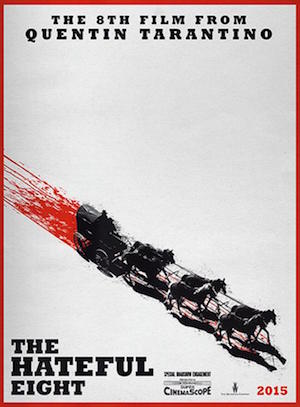
The Lincoln Letter
by ALEX CARNEVALE
The Hateful Eight
dir. Quentin Tarantino
167 minutes
 Inspiration had to run out at some point. Quentin Tarantino made the most fun motion pictures around for the past two decades. Now he has stopped caring completely. His use of the n-word becomes rather tiring at some point during The Hateful Eight, so that the movie becomes something truly hateful rather than joyful. The fact that this is yet another historical treatment of the slur by Tarantino makes all his modern films, filled to the brim with the sobriquet, kind of embarrassing in retrospect.
Inspiration had to run out at some point. Quentin Tarantino made the most fun motion pictures around for the past two decades. Now he has stopped caring completely. His use of the n-word becomes rather tiring at some point during The Hateful Eight, so that the movie becomes something truly hateful rather than joyful. The fact that this is yet another historical treatment of the slur by Tarantino makes all his modern films, filled to the brim with the sobriquet, kind of embarrassing in retrospect.
Major Marquis Warren (Samuel L. Jackson) could have been an inspiring hero — a Civil War veteran reduced to submitting the corpses of wanted people to make his living as a Wyoming resident. The concept of such a character as a detective is the only compelling part of the turgid three hours encompassed in The Hateful Eight.

The film disappointingly takes place at one location: Minnie's Haberdashery, a waystation for travelers passing through to the town of Red Rock. There is no much to this setting; it is basically one large room in a wooden building. Tarantino has taken such effort with his locations in the past — we think of the fantastic Japanese palace in Kill Bill, or the diner in Pulp Fiction or the mall in Jackie Brown. The $60+ million spent on The Hateful Eight must have all gone to the cast and crew. Here is just a room, and we barely ever leave its confines.

The actors in it are his usual regulars, most of whom are pretty familiar with the extensive sentences that are part and parcel to Tarantino's oeuvre. Tim Roth appears to be doing an impression of Christoph Waltz, Michael Madsen mumbles through scene after scene, and Kurt Russell intones every line as if it might be his last.
The new performers are all serviceable but get very little play. Jennifer Jason Leigh mostly just sits and grumbles the entire movie, while Channing Tatum seems badly underwritten and out of place here. Rising Mexican star Demian Bichir has his face covered the entire time, and Keith Jefferson barely gets three lines.

Walton Goggins is the major new addition. He is the new sheriff of Red Rock who joins the caravan of Samuel L. Jackson and Kurt Russell on the way escorting fugitive Daisy Domergue (Leigh) to town. Goggins has not been hurting for work this past year, but I begin to miss the hardened subtlety he displayed on The Shield. He is just as broad and wide open as the performances of his fellow passengers, and in The Hateful Eight it feels like shouting to be heard most of the time.

This can be wacky Tarantino-like fun, but in The Hateful Eight none of the conversation, most of which is about the Civil War, ever goes anywhere. The plot mostly concerns the identity of gang members who are trying to prevent the timely death of Ms. Leigh. Answers are not very surprising and what mystery there is in the film's plot is extremely dull to watch unfold. It feels like Tarantino wrote this all out in a morning and decided to see if he could put so much style around it that we would not notice there is no substance.

The film feels especially thin because this would have been exactly the moment to do something dramatic and important with Jackson's character. Instead we have a budget version of the black man's Civil War story. In one scene Major Warren describes making a confederate soldier suck him off in the snow. The whole thing is played for laughs, but it is not really all that funny, and we feel bad for even chuckling. That's the best Tarantino can do? Gay jokes?

Westerns were numerous because they don't require much in the way of sets or costumes. The Revenant looks like it costs three times as much as The Hateful Eight, and that matters because it was worth it to not feel we were on a theatrical set. Tarantino loves cinema, but maybe he needs to realize that what was good enough sixty years ago is dull today. I know he already made an important and exciting film about slavery, Django Unchained, but this could have been the same thing, only in the Reconstruction. Instead it just needs reconstructing.
Alex Carnevale is the editor of This Recording.

"Confessions of a Romance Novelist" - The Anchoress (mp3)
